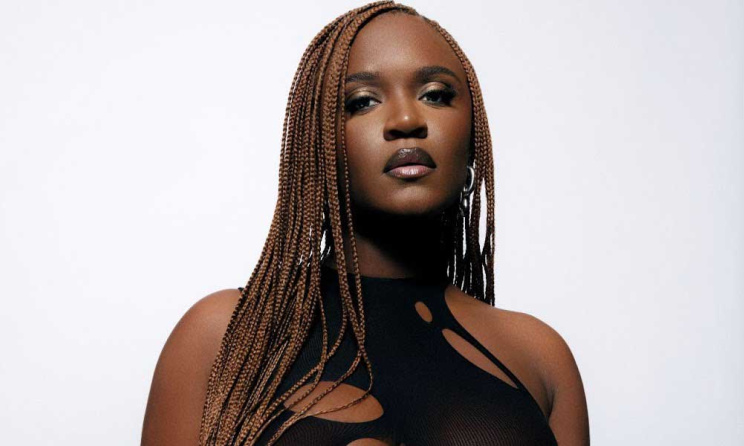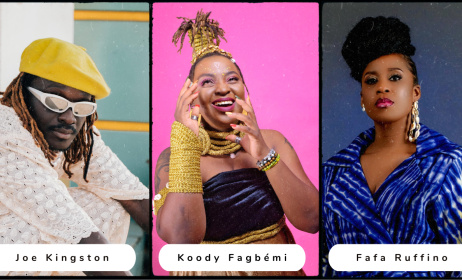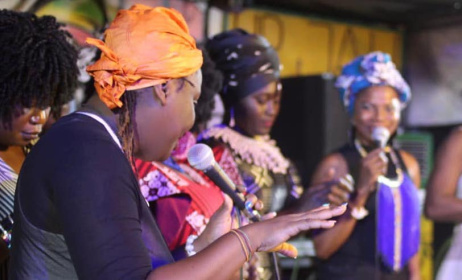Amaarae talks about latest album and representing Africa on the global stage
During our 2021 conversation, Ghanaian-American musician Amaarae noted that a global perspective was forming around her music. Two years later, propped up by a string of major accomplishments and a new album, I’m curious to explore how her views have evolved.
 Amaarae.
Amaarae.
“What do I say now? I think a global perspective has formed around my music, like many others,” she declares when I join her in the backseat of a Bentley during her recent return to Accra. She embraces the morning sun in a co-ord set comprising a form-fitting, long-sleeved crop top and a miniskirt. Her freshly made braids cascade just below her shoulders, accentuating her face, which is adorned with natural day makeup. Two strands of braids drape over her cross punk charm necklace. Completing her look are knee-high, pointy-toe zipper boots adorned with rings, matching the camo colour of her outfit.
“Now, I’m more interested in representing Africa in the best way possible on the global stage, even coming back to my last album,” she continues. “I think there are a lot of global sounds. But at the core of it, the drums and the bass are all African. I’m well-travelled and love exploring new places so that I can teach my people something new, but at the end of the day, all that matters is that I’m African and that’s what I’m representing.”
In the past, when African alternative music was not so accessible, there was a prevailing concern about the possibility of creative innovation being misinterpreted or undervalued. This sentiment was frequently associated with Amaarae’s music, which explores a diverse range of genres such as Afro-fusion, pop-punk, alt-R&B, and progressive house. I ask about her insights on the evolution of fringe genres and their current state of growing popularity.
“That always happens,” she says. “If you look at the history of music, hip hop existed on the fringes and it eventually superseded pop and rock and became the main sort of pop music. When you look at all the artists right now, whether it’s Fireboy DML, Burna Boy or Wizkid, Rema, Ayra Starr, Black Sherif or the Asakaa Boys, everyone has the alté vibe that was once chastised. Even with the music and bounce: the bounce of Afrobeats now was the alté bounce in 2015. I think it always happens. Eventually, what’s seen as foreign or outcast always makes its way to the forefront.”
The 28 year old recounts unsuccessfully navigating the Ghanaian music space for a whole year, after going into music professionally around 2017. Eventually, she relocated to Nigeria where she immersed herself in the local alternative music scene, and then to London for ease of travel. For this, she is frequently cited in the narrative that Ghanaians don’t support their own. Given her journey, I ask Amaarae if she can pinpoint the origin of this sentiment and how she sees it after all these years.
There’s a long pause, before she offers me an answer.
“It’s rather unfortunate,” she begins, acknowledging her awareness of the online conversations. She admits feeling wary of being the narrative’s poster child. “But I think that we’ve reached a point where my contribution to what Ghana means to the world is undeniable. So, eventually, people are coming to that realisation and are warming up to it. As we’re seeing, more and more African artists breaking the mould, Ghana wants to be a part of that conversation and I think it’s about time. And I think we’re getting there.”
We then delve into Amaarae’s recently released, sophomore album Fountain Baby, which retains the R&B foundation that the artist is known for, but also incorporates the forward-looking fusion that her fans have come to expect, like classical elements, West African percussion, and Arabic music scales.
Amaarae tells me that this is a conscious choice, and she admires producers and artists who incorporate unexpected sounds into their music. “Timbaland loves Eastern sounds, but he would also use a baby’s sound in place of a snare. I want to take this type of risk with African music because I don’t think anyone has done it before, at least production-wise,” she says.
Sexual liberation is often seen as a crucial aspect of female empowerment, and it’s a theme that resonates with Amaarae’s work, which frequently employs sexual tropes. Many say that for a woman to be truly empowered, she must embrace her own sexuality. I ask Amaarae about her thoughts on this observation and how she perceives the relationship between sexual liberation and female empowerment as portrayed in Fountain Baby.
Another long pause. . . “It has played an important role in who I am as a person. So when I’m making music, I’m expressing what I feel most passionate about at that moment. It’s less about sex and more about love at the moment.”
Still, given the album’s exploration of themes like artistic expression and the subversion of gender norms, I ask her if she has concerns about these aspects being overshadowed by a focus on sex. After all, sex-related themes tend to attract more attention and sell music.
“You know, that’s a good question,” she says. “I think that my writing is layered in such a way that you can’t get to the message of artistic expressions and liberation, and so forth, without going through the things that are palatable. The metaphors on sex, relationships and love are equally intertwined with some of the more personal and political expressions. It’s the way I write music. It’s all intertwined, so you can’t escape it.”
Amid an ocean of similarly sounding musicians, Amaarae’s falsetto and head voice can hardly be compared to others. She understands the value of her distinct sound and stresses her commitment to ensuring that it remains fresh and distinct. “It’s the most important thing to have a unique sound, even if it’s copied to be identifiable to you,” Amaarae says.
I bring up Wande Coal, himself a falsetto king with whom Amaarae collaborated on 2019’s ‘Spend Some Time’. Amaarae likens their creative partnership to that of a master and student, saying that working with the experienced Nigerian artist permitted her to step into more of a producer’s role. Amaarae recalls Wande Coal providing multiple verses for the track. “He did like 50 different iterations,” she says. These allowed her to select and piece together the best elements: melodies, inflexions, intonations and flows.
“I had done my part by the time he came. I think it was a testament to Wande’s artistic prowess. He kinda saw how I performed and knew the best way to respond to that. I didn’t know what he was going to do, I didn’t know what to expect, but I really feel like he had an understanding of ‘Okay, this is her approach, how can I take it to the next level?’ On the record, Wande hits higher notes, which I thought was amazing.”
Our chat ends with a topical subject: the Grammys’ addition of the Best African Music Performance category. The introduction of the new category follows widespread calls for greater recognition of African music at the awards, which have faced criticism for overlooking the highly popular Afrobeats genre in recent years. Amaarae believes that African artists have often been outsiders of the global music scene, and now that their music is at the forefront, it makes sense to aspire for the highest recognition.
But she emphasises that her personal focus is not solely on Western approval but rather on touching the world with her music and resonating with people from diverse regions and cultures.
“As we are taking on the world, we have to think about how we nurture and build home, making sure that we honour ourselves in our true nature and our true capacity. We have to value and build our communities first, value that and work on it. Then the world will follow suit,” she says.
























Commentaires
s'identifier or register to post comments